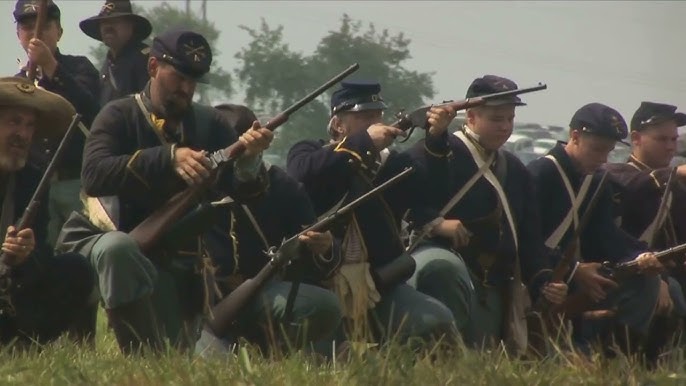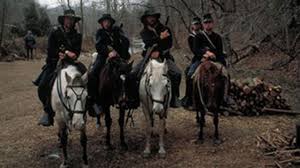🎬 Pharaoh’s Army (1995)
- thaiduong
- January 13, 2025

Pharaoh’s Army (1995) Review: A Quiet Yet Powerful Civil War Drama
Pharaoh’s Army, directed by Robby Henson, is a hauntingly intimate exploration of the human cost of the American Civil War. Set in the Appalachian Mountains, the film forgoes large-scale battles and grandiose action for a deeply personal narrative about the conflict’s impact on individuals. Featuring standout performances by Chris Cooper, Patricia Clarkson, and Kris Kristofferson, Pharaoh’s Army is a somber, thought-provoking film that examines themes of loyalty, loss, and the blurred lines of morality in wartime.
Plot Overview: A Clash of Allegiances and Humanity
The film is set in rural Kentucky during the Civil War, where divided loyalties between the Union and Confederacy tear families and communities apart.
Union Captain John Hull Abston (Chris Cooper) leads a small band of soldiers to requisition supplies from a remote farmstead owned by Sarah Anders (Patricia Clarkson), a Confederate widow raising her son alone. The forced interaction between the soldiers and Sarah reveals the human toll of war, as ideological divides give way to complex emotional and moral struggles.
As tensions rise, the arrival of a Confederate deserter (Kris Kristofferson) further complicates the delicate balance of power and humanity on the farm.
Chris Cooper as Captain John Hull Abston: A Complex Leader
Chris Cooper delivers a nuanced performance as Captain Abston, a man torn between duty and decency. His portrayal captures the internal conflict of a soldier trying to uphold his orders while grappling with the humanity of those he is ordered to victimize. Cooper’s restrained yet emotionally charged performance anchors the film, making Captain Abston a compelling and sympathetic character.
Patricia Clarkson as Sarah Anders: Strength and Resilience
Patricia Clarkson shines as Sarah, a widow whose loyalty to the Confederacy is intertwined with her love for her family and her land. Clarkson’s performance is both understated and powerful, portraying Sarah’s resilience in the face of grief and adversity. Her interactions with Captain Abston are the emotional core of the film, as the two characters navigate their conflicting loyalties and shared humanity.
Kris Kristofferson as The Deserter: A Catalyst for Conflict
Kris Kristofferson’s brief but impactful role as a Confederate deserter adds tension and complexity to the story. His character serves as a reminder of the war’s brutality and the desperation it engenders. Kristofferson’s rugged presence and quiet intensity leave a lasting impression, even with limited screen time.
Themes: The Moral Grayness of War
Pharaoh’s Army delves into the complexities of war, emphasizing that loyalty and morality are rarely clear-cut. The film explores themes of:
- Moral Ambiguity: The soldiers and civilians alike struggle with questions of right and wrong, as survival often demands difficult choices.
- Human Connection: The interactions between Union soldiers and Confederate civilians highlight the shared humanity that transcends political divides.
- The Cost of War: Through its intimate focus on a single farmstead, the film portrays the devastating impact of war on individuals, families, and communities.
Direction and Cinematography: A Quiet, Atmospheric Approach
Robby Henson’s direction is understated yet effective, focusing on the small, human moments that define the film’s narrative. The Appalachian setting is beautifully captured by cinematographer Matthew Irving, with misty hills and rugged landscapes serving as a poignant backdrop to the story’s emotional weight.
The film’s deliberate pacing allows for a slow build of tension, drawing viewers into the lives of its characters. This approach emphasizes the emotional stakes over physical action, making every interaction and decision resonate deeply.
Key Moments That Define Pharaoh’s Army
- The Requisitioning of the Farm: The initial interaction between Captain Abston’s soldiers and Sarah sets the tone for the film, showcasing the power dynamics and underlying tensions of the Civil War.
- The Dinner Scene: A shared meal between the soldiers and Sarah is fraught with unspoken emotions and ideological divides, serving as a microcosm of the film’s central themes.
- The Climactic Confrontation: The arrival of the Confederate deserter leads to a tense and tragic resolution, underscoring the devastating consequences of war.
Strengths of Pharaoh’s Army
- Authenticity: The film’s attention to historical detail and its focus on everyday people give it a sense of realism and immediacy.
- Powerful Performances: Cooper, Clarkson, and Kristofferson deliver performances that elevate the film’s emotional impact.
- Subtle Storytelling: The film’s restrained approach allows for a nuanced exploration of its themes, making it both thought-provoking and emotionally resonant.
Weaknesses of Pharaoh’s Army
- Slow Pacing: The film’s deliberate pace may feel too slow for viewers expecting more traditional Civil War action.
- Limited Scope: While the intimate focus is a strength, some may find the lack of broader context or larger-scale events less engaging.
- Sparse Dialogue: The film’s reliance on subtlety and atmosphere means that some characters’ motivations may feel underexplored.
Legacy and Reception
Although not a widely known film, Pharaoh’s Army has earned praise for its intimate storytelling and strong performances. It offers a unique perspective on the Civil War, emphasizing the personal and emotional toll of the conflict over grand battles and historical milestones.
Fun Facts About Pharaoh’s Army
- Historical Inspiration: The film is based on real-life accounts of the Civil War’s impact on rural communities in Kentucky.
- Small Production: As an independent film, Pharaoh’s Army was made on a modest budget, which contributes to its raw and authentic feel.
- Praise for Cooper and Clarkson: Both leads received critical acclaim for their performances, with many citing their work as the highlight of the film.
Conclusion: A Quietly Devastating War Drama
Pharaoh’s Army (1995) is a poignant and introspective Civil War film that eschews traditional battle scenes for an intimate exploration of humanity amid conflict. With standout performances from Chris Cooper, Patricia Clarkson, and Kris Kristofferson, the film is a thought-provoking meditation on loyalty, morality, and survival. While its slow pacing and narrow scope may not appeal to all viewers, it is a rewarding watch for those seeking a more personal and reflective take on the war.